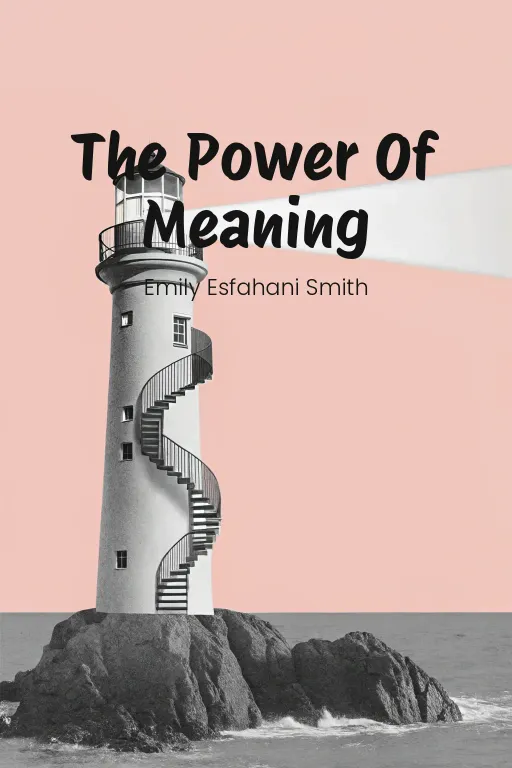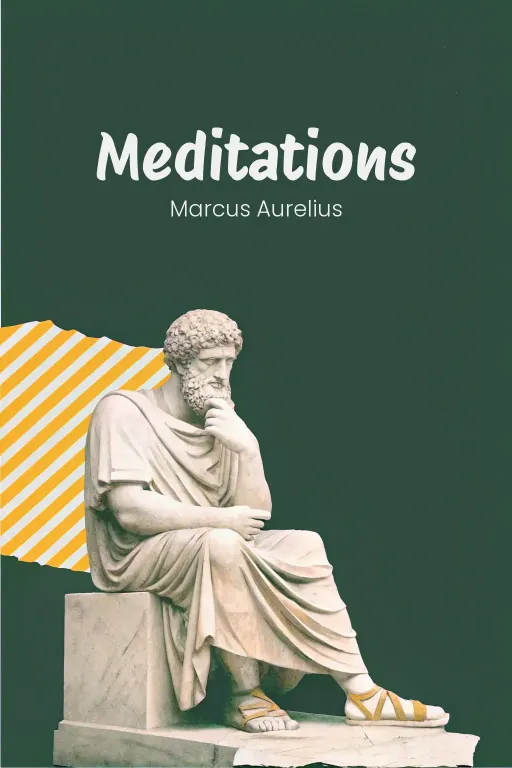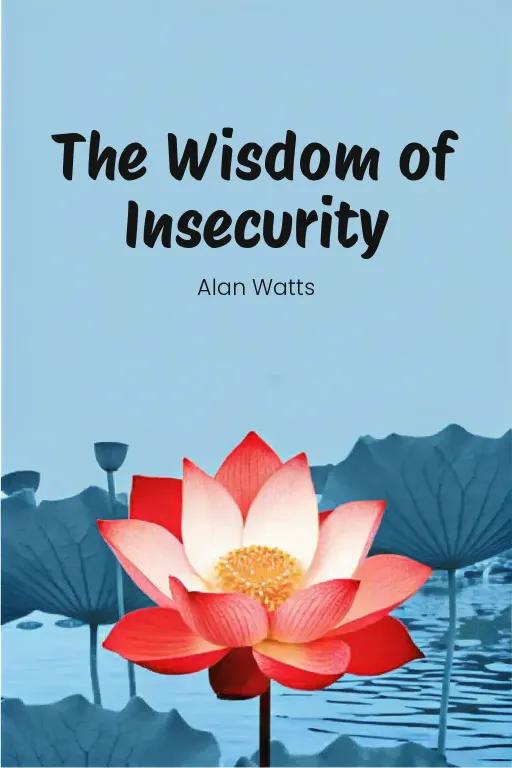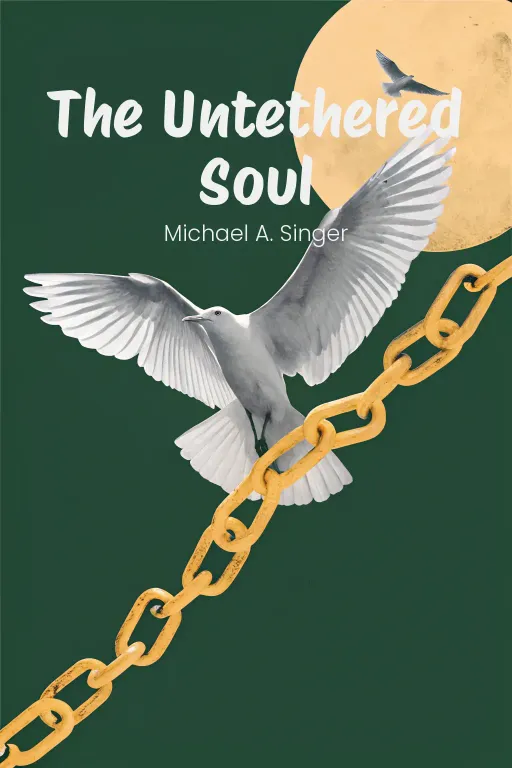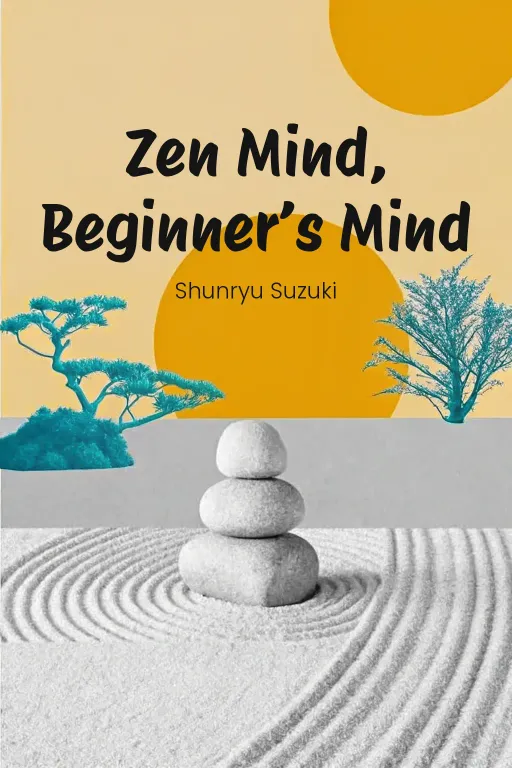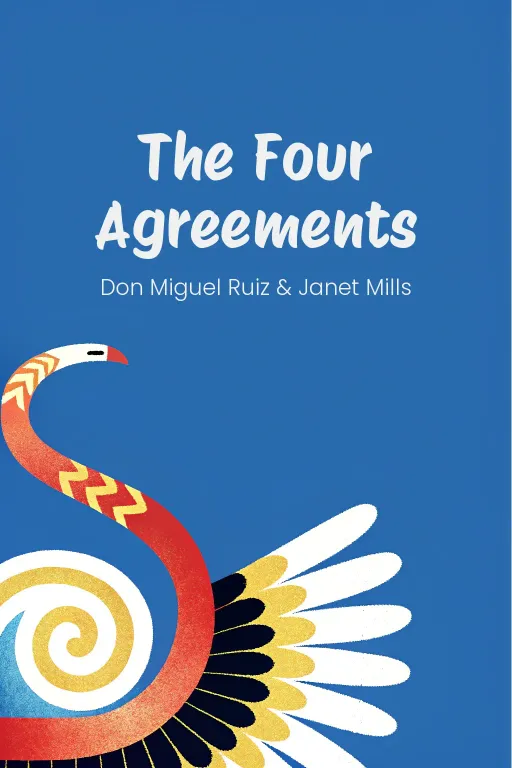
Ditch Stability: Find Real Peace Now
Podcast by The Mindful Minute with Autumn and Rachel
Introduction
Part 1
Autumn: Hey everyone, welcome to the podcast! So, let's jump right in. Ever feel like you're constantly striving for stability? You know, a stable career, solid relationships, even just consistent daily routines? And then, BAM! Life throws you a curveball anyway? Rachel: Oh, tell me about it. It's like trying to build a fortress out of marshmallows. Looks good for a second, but you know it's not going to last. So, Autumn, why are we so stressed about this whole “stability” thing anyway? Autumn: Exactly! Well, that’s the core of what Alan Watts explores in The Wisdom of Insecurity. He really digs into why our desire for permanence, for something concrete to rely on, actually makes us more anxious, not less. Watts makes the case that this endless pursuit distracts us from the present and hides the real truth about who—or what—we are. Rachel: Okay, so Watts is basically saying it's not the marshmallow fortress that's the problem… it's our obsession with making it last forever? Autumn: Precisely. And that’s what we’re diving into today. We're breaking down three key ideas from Watts's philosophy. First, how this need for certainty actually feeds the anxiety we're trying to avoid. Then, why we've created a distance between ourselves and the natural rhythm of life, and how that makes us fear change even more. Rachel: And I'm guessing the grand finale is Watts telling us to, I don't know, throw our hands up and embrace the chaos? Autumn: Not quite! The third part is about how accepting impermanence isn’t just about putting up with the unpredictable nature of life, but about actively engaging with it. Watts shows us how letting go of that need to control everything can unlock a sense of freedom, peace, and a much deeper connection to, well, everything. Rachel: Alright, Autumn. Let's see if this Alan Watts can actually teach us how to navigate the waves of uncertainty without totally wiping out every time.
The Nature of Insecurity
Part 2
Autumn: Okay, Rachel, let’s dive in with the basics: the nature of insecurity. Watts argues that insecurity stems from trying to hold onto things that are inherently temporary. I mean, think about it – how often do we pin our sense of security on external things, like a job, a relationship, or even our identity? Rachel: Oh, way too often. It's like building these emotional towers, hoping they won’t collapse, even though we know the ground is shaky. But the real question is, why are we so bad at accepting something even a kid understands – that nothing lasts? Autumn: Because we're human! Unlike animals that live in the moment, based on instinct, we have this thing called self-awareness. Watts gets into this right away. He explains that while self-awareness allows us to create art, science, and everything else, it also traps us in this loop of wanting permanence. We crave guarantees – guarantees we'll always be loved, successful, in control. Rachel: And the universe just laughs at that. So we double down, thinking, "Fine, if you won't promise stability, I'll “make” my own!" Cue skyscrapers, insurance policies, and calorie-counting apps. Autumn: Exactly, but Watts points out how this pursuit of permanence often backfires. He uses this metaphor of life being "flickers of light between two eternal shadows" – birth and death. It's such a haunting image, capturing the fleeting nature of everything. And yet, because we know life is brief, we cling even tighter. Rachel: Total paradox, right? It reminds me of the classic career rat race. People chase promotions, accolades, financial milestones, thinking, "Once I get there, I'll finally be secure." But what happens when they arrive? Autumn: They don’t relax, they just move the goalpost! Or they worry about losing what they've gained. Watts nails it when he says we fear losing what we have even more than we feared never having it in the first place. It's this never-ending anxiety loop, all driven by the idea that external achievements will somehow stabilize an inherently unstable existence. Rachel: Bleak, yet… annoyingly true. So, let's talk about this illusion of stability that Watts talks about. I get how chasing money or status can cause insecurity, but he goes even deeper, right? He challenges who we think we are. Autumn: Absolutely. Watts takes aim at our concept of the “self.” We tend to think of ourselves as fixed, as in "I'm “me,” and I'll always be me.” But he says that's an illusion. What we call the self is ever-changing – a constant stream of thoughts, memories, and emotions, like a river always in motion. Rachel: Wait a minute. Are you saying my entire identity – all those awkward school photos, questionable haircuts, and years of therapy – is just a mental slideshow I’ve labeled "Rachel"? Autumn: Pretty much! And according to Watts, the problem is when we cling to this image we've created. Say you identify as "successful." That becomes a fragile house of cards. One career setback, and suddenly your whole world feels like it's collapsing. Rachel: It's like an actor who thinks they are the character they're playing, until the curtain falls and they can't remember who they are without the costume. That's… unsettling. Autumn: But liberating, too. Watts says that this fixation on maintaining our image—our ego—is a huge driver of insecurity. If you’re always defending or proving who you are, how can you ever feel at peace? Rachel: So, Watts sees the self as another sandcastle we're obsessed with. Always protecting it, polishing it, panicking when it starts to erode? Autumn: Exactly. And that leads us to his core solution: the backwards law. Rachel: Ah, yes. The part where he completely flips the problem. Tell me about it. Autumn: The backwards law is simple but really profound. Watts says the harder you strive for security, the more it evades you. But if you embrace insecurity, you paradoxically find a deeper sense of peace. It's like quicksand – the more you struggle, the faster you sink. But if you relax and let go, you float. Rachel: Hmm. That’s… counterintuitive, to say the least. Can you give me a real-world example? Something that makes it less "wisdom" and more concrete? Autumn: Relationships are a great example. Think about couples who are obsessed with securing their partner’s love – constantly seeking reassurance, trying to control things. That clinging tends to create resentment or fear, often creating the very distance they're trying to avoid. Rachel: Whereas couples who just accept that love might not last forever… actually enjoy it more? Autumn: Exactly! By letting go of needing guarantees, they're free to fully engage in the connection, without fear dictating their actions. Rachel: Alright. So Watts is saying peace isn’t about fortifying your sandcastle—it’s about walking along the shore, knowing the waves will come, and being okay with that? Autumn: That's a beautiful way to put it. And the key is mindfulness – shifting from obsessing over future outcomes to fully inhabiting the present. Rachel: So, instead of stressing about whether my retirement fund will survive the next market crash, I should… appreciate the sandwich I’m eating right now? Autumn: Precisely. Watts uses mindfulness to bring us back to the present moment. It’s not about ignoring responsibilities – it’s about noticing when your mind is spiraling into "what ifs" and consciously reorienting to your immediate experience. Rachel: Alright, Autumn, you’re convincing me… cautiously. Any tips from Watts on how to actually do this without accidentally zoning out during important meetings? Autumn: Absolutely. Mindfulness can be as simple as pausing to notice your breath, the sensation of your feet on the ground, or even the sounds around you – like the AC or traffic. It's training your attention to check back into reality, rather than living in a fantasy of what might happen. Rachel: And by doing that, we detach from the need to control the future – or our perfectly curated, Instagram-worthy identities? Autumn: Exactly. And then we can access the freedom and calm Watts talks about – the freedom that comes when we stop resisting life as it is.
The Illusion of Separation
Part 3
Autumn: So, understanding why we feel insecure naturally leads us to how we perceive time and ourselves. And that's where Watts drops this idea of the illusion of separation. Rachel: Wait, so it’s not just about trying to hold onto something temporary, it's the realization we were never alone? Autumn: Precisely! Watts basically says one of our biggest mistakes is thinking we're all alone, separate from life. And it's not just personal. It shapes our whole culture. Rachel: Okay, so he's saying the idea of "self" is wrong. But why do we even believe in this separation? Isn't defining ourselves kind of crucial for survival? Autumn: Right, Watts would agree that defining ourselves gives structure. But he says it's a double-edged sword. It's practical, like labeling things "me" or "you" to navigate the world. But it can create boundaries where they don't “really” exist. We start to feel like we're isolated. Rachel: Okay, so is Watts saying we're more like waves, unique for a moment, but inseparable from the sea, ever changing? Autumn: Exactly! He uses the ocean analogy to break down the belief that we are separate. A wave looks so distinct, but it's just the ocean moving. No ocean, no wave. We exist as part of something bigger, connected to everything. Rachel: So, when I'm overthinking something, Watts would say: "Hey, you're part of flow, chill out?" Autumn: <Laughs> something like that! It runs a lot deeper than stress though. It’s in how we treat pretty much everything around us. Take the environment. We act like nature exists for the sole purpose of us. To be used without end. Rachel: Ah, here it comes, the guilt. We consume while pretending we're above it all, then question why the planet’s failing. Autumn: Exactly. This is because of the illusion of being separate. We think we're our own being rather than threads in some web. Climate change, deforestation? It's not just resources — it's forgetting we ARE nature. Self-harm. Rachel: Okay, so our separation from nature is one sign. But what about us? Does it mess with our minds in the same way? Autumn: Definitely. Watts points out it creates a divide within us too, between mind and body. Rachel: Isn’t that Western thought? "I think, therefore I am?" Autumn: And Watts argues that this IS the problem. We prioritize rational thought and see the body as a machine. We create the illusion that the mind is separate. Rachel: So when I grab that third coffee, ignoring my body, I’m playing into this myth of mind over body? Autumn: Yep. This leads to bad habits, and deeper feelings of dissatisfaction. Like Western medicine that treats symptoms, like medicine for stomach pain, without stress considerations. Rachel: So, slapping on a band-aid without looking underneath? Autumn: Right. It's everywhere. Emotions are separate from intellect. Others are "them" and not "us". It all reinforces separation. Rachel: Okay, Watts has me questioning my coffee habits. But how do we fix this? Something practical please, no philosophizing. Autumn: Glad you asked! Watts says practices to integrate mind and body can reconnect us. Yoga, for example. Breath with movement syncs the mind and connects it to body. Rachel: So downward dog becomes enlightenment prep? Autumn: Exactly! You cultivate awareness and dissolve mental separations. Rachel: But what about language? I mean, we couldn’t have this discussion without “self” and “body.” Watts talks about that too, right? Autumn: Oh yeah. Watts says language always reinforces the illusion of separation. Words are very useful, but divide reality by dividing things that connect. Rachel: Like calling something a “mountain” vs a “valley” when one can’t exist without the other. Our brains see them as opposites. Autumn: Exactly! That applies to how we talk about ourselves. "I" and "me" are fixed. But in reality, self is ever-changing. More like a verb. Rachel: So this entire identity I cling to, is a linguistic illusion? Autumn: Not at all. Language is a tool to navigate daily life. But Watts wants us to realize it's not actually “REAL”. When we take labels too seriously we create insecurity. Rachel: If we drop these separation lines, we stop feeling so fragmented. Autumn: Exactly. And that's where freedom starts. Rachel: So Watts is telling us to stop fixing our separateness. Autumn: Yes! We were never separate. Recognizing that is the true freedom.
Embracing Impermanence
Part 4
Autumn: So, after dismantling those artificial barriers we create for ourselves, we can “really” dive into the freeing alternative, which is embracing impermanence and being present. This is the practical answer to the challenges we've been discussing - our useless struggle for control, our fear of being insecure, and that illusion that we're all separate. Watts is offering a way forward, not by fighting against life, but by just accepting that everything changes. Rachel: Okay, so instead of battling the current, Watts wants us to just let go and go with the flow, huh? Easier said than done, I think. How is "letting go" any different from just giving up? Autumn: Well, that's something people often misunderstand. Letting go, in Watts's view, isn't about being passive or like you don't care. It's more about shifting your perspective. It means realizing that holding on so tight – whether it's to material things, your career goals, or even the idea you have of yourself – actually makes things worse. You know? It’s seeing life as it “really” is, instead of trying to force it to be what we wish it was. Rachel: Okay, but can you give me a real-world example? How does clinging actually hurt us? Isn't striving for something what pushes us forward, both as individuals and as a society? Autumn: Of course, working hard to achieve has its place, definitely, but Watts draws an important line. Think about that entrepreneur who got rich “really” young. They hit all their targets, but instead of feeling happy, they became super anxious, worrying all the time about keeping their status and losing everything they'd worked for. That success they wanted so badly became like a prison. Rachel: So, the higher you climb, the harder you fall. I get it. But doesn’t that just mean we need to be better prepared – spread out our risks, diversify our portfolio and so on? Autumn: Well, that's a logical way to look at it, sure, but Watts would say that misses the point. It's about believing that who you are or what you're worth is tied to things outside yourself. No matter how much you plan, life is going to surprise you. So, the answer isn't to build an unbreakable castle. It's to stop thinking you are the castle. Rachel: That's a big ask, Autumn, isn't it? Separating your sense of self from your accomplishments or what you do? People spend their whole lives defining themselves by those things. Autumn: Right, and that's why Watts suggests mindfulness as a practical tool. It's not about changing completely overnight, it's about doing small things every day to get back in touch with the present moment. Imagine you’re sitting on a bench in a park, and you notice the breeze, the sounds around you, and how you're breathing. That simple thing can keep you in the present and remind you that life is lived one moment at a time, not in some imagined future. Rachel: And what happens when my mind wanders off, like to my retirement plan or whether I left the oven on? Autumn: That's where mindfulness “really” helps. It's not about stopping those thoughts. It's about noticing them and then gently bringing your focus back to what's real – what you're sensing in the world around you. When you do this regularly, you start to break that habit of living in the "what ifs" of the future or the "should haves" of the past. Rachel: I can see how that could be freeing. But doesn't it feel…small? Like, I can try to enjoy the moment, but the world is still chaos. Bills still need to be paid. People you care about are still going to disappear somehow. Autumn: And that's what's so great about Watts's philosophy – it doesn't say it'll get rid of life's problems. It just changes how you see them. Accepting that nothing lasts doesn't mean ignoring those realities. It means accepting them as part of life. Think of a gardener taking care of their garden. They know the flowers will die eventually, but that doesn't stop them from caring for the plants. They experience the seasons and see winter as part of the life cycle, not something to fight against. Rachel: Okay, but that gardener still feels sad when the flowers die, right? Or when winter is worse than expected? Autumn: Of course, and Watts wouldn't say you shouldn't. Sadness, loss, and uncertainty are part of being human. But fighting change only makes things worse. By accepting that things don't last, the gardener—or any of us—can enjoy each moment without being afraid of holding on or sad about letting go. Rachel: And this connects to that "backwards law" you talked about earlier, right? The more you try to hold on or control something, the more insecure you feel? Autumn: Exactly. It sounds strange but it's true. Think about relationships. Couples who are obsessed with making things permanent, demanding guarantees of love or being scared of change, often create tension. But the couples who accept that relationships are uncertain can love more freely, without fear choking the relationship. Rachel: So, by admitting that something is fragile, you actually give it room to grow. That's… the opposite of what you'd think, but I get it. And I guess this applies to more than just relationships? Autumn: It does. Whether it's your career, your possessions, or even how you see yourself, embracing that nothing lasts lets you live life fully, without needing to hold on to some fake sense of control. It's not about avoiding loss or failure. It's about realizing that everything, including you, is part of something bigger that's constantly changing. Rachel: That wave and ocean metaphor is starting to make sense. The wave might crash, but it's still part of the ocean's rhythm – still important, even if it doesn't stick around forever. Autumn: Exactly. And once we stop fighting that flow, we can experience the deep peace and beauty that comes from just being present in it.
Conclusion
Part 5
Autumn: Okay, Rachel, time to bring this home. Today we dove into Alan Watts' thoughts on insecurity—how our need for everything to stay the same just makes us more anxious, how thinking we're separate from everything messes up how we see ourselves, and ultimately, how accepting that nothing lasts can actually set us free. Rachel: Exactly. I think the key takeaway here is the more we hold on—to stability, who we think we are, or how things should turn out—the more stuck we get in this loop of fear and trying to control everything. Watts isn’t saying, "give up on life," just, live it without feeling like you have to know what’s coming or protect this fragile idea of "me." Autumn: Precisely. And his answer isn't about hiding from the tough stuff, but facing it head-on with an open and present mind. By practicing mindfulness, letting go of who we think we should be, and just accepting the flow of life, we make room for real peace—the kind that doesn't need guarantees. Rachel: So, instead of frantically building sandcastles and bracing for the tide, we learn to appreciate the tide itself—and maybe even play in it. It’s not about getting rid of insecurity altogether; it’s about turning it into a way to connect more deeply and be more present. Autumn: Nicely said, Rachel. So here's a question for everyone to consider: What would change in your life if, instead of fighting uncertainty, you decided to embrace it? Because, as Watts reminds us, true security isn’t about being in control—it’s about discovering the freedom to let go.

